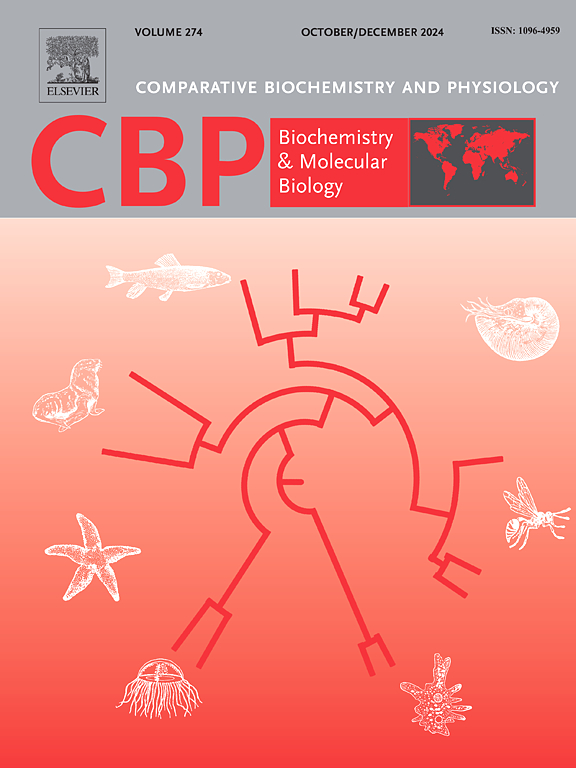Effects of acute low-temperature stress on respiratory metabolism, antioxidants, and metabolomics of red swamp crayfish, Procambarus clarkii
IF 1.9
3区 生物学
Q4 BIOCHEMISTRY & MOLECULAR BIOLOGY
Comparative Biochemistry and Physiology B-Biochemistry & Molecular Biology
Pub Date : 2025-03-25
DOI:10.1016/j.cbpb.2025.111095
引用次数: 0
Abstract
Crayfish (Procambarus clarkii) aquaculture is threatened by abrupt temperature decreases caused by climatic phenomena, such as cold waves and seasonal fluctuations. In this study, crayfish were exposed to an abrupt temperature change from 17 °C to 7 °C for 24 h to investigate the effects of acute low-temperatures on respiratory metabolism, antioxidants, and metabolomics. The results showed that acute low-temperatures significantly reduced the activities of pyruvate kinase, lactate dehydrogenase, and succinate dehydrogenase in the gills and hemolymph, associated with decreases in anaerobic and aerobic respiratory capacities, and significant decreases in oxygen consumption, ammonia excretion, and maximum metabolic rates. Antioxidant enzymes in the hepatopancreas and hemolymph initially increased then decreased within 24 h. Metabolomics revealed that glycerophospholipid metabolism and glycosylphosphatidylinositol anchor biosynthesis pathways responded to acute low-temperatures, with glycerophospholipids being the most significantly differentially expressed metabolites. These results supported the hypothesis that crayfish exhibit lower metabolic activity at low temperatures. Our data provide mechanistic insight into the biological changes induced by acute low-temperature and may provide insight into culture of P. clarkii in cold waters.

急性低温胁迫对克氏原螯虾呼吸代谢、抗氧化剂和代谢组学的影响
由于寒潮和季节波动等气候现象引起的气温骤降,对克氏原螯虾(Procambarus clarkii)的养殖构成了威胁。本研究将小龙虾置于17°C到7°C的温度突变环境中24 h,研究急性低温对小龙虾呼吸代谢、抗氧化剂和代谢组学的影响。结果表明,急性低温显著降低了鳃和血淋巴中丙酮酸激酶、乳酸脱氢酶和琥珀酸脱氢酶的活性,导致无氧和有氧呼吸能力下降,耗氧量、氨排泄量和最大代谢率显著降低。肝胰脏和血淋巴抗氧化酶在24 h内先升高后降低。代谢组学显示,甘油磷脂代谢和糖基磷脂酰肌醇锚定生物合成途径对急性低温有反应,其中甘油磷脂是差异表达最显著的代谢物。这些结果支持了小龙虾在低温下表现出较低代谢活性的假设。我们的数据为急性低温诱导的生物学变化提供了机制上的见解,并可能为克拉氏杆菌在冷水中的培养提供见解。
本文章由计算机程序翻译,如有差异,请以英文原文为准。
求助全文
约1分钟内获得全文
求助全文
来源期刊
CiteScore
4.60
自引率
4.50%
发文量
77
审稿时长
22 days
期刊介绍:
Comparative Biochemistry & Physiology (CBP) publishes papers in comparative, environmental and evolutionary physiology.
Part B: Biochemical and Molecular Biology (CBPB), focuses on biochemical physiology, primarily bioenergetics/energy metabolism, cell biology, cellular stress responses, enzymology, intermediary metabolism, macromolecular structure and function, gene regulation, evolutionary genetics. Most studies focus on biochemical or molecular analyses that have clear ramifications for physiological processes.

 求助内容:
求助内容: 应助结果提醒方式:
应助结果提醒方式:


